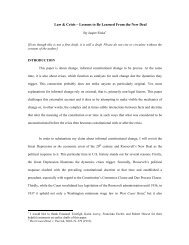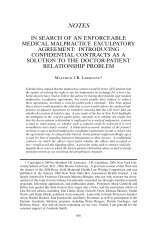Guide to Foreign and International Legal Citations - New York ...
Guide to Foreign and International Legal Citations - New York ...
Guide to Foreign and International Legal Citations - New York ...
Create successful ePaper yourself
Turn your PDF publications into a flip-book with our unique Google optimized e-Paper software.
GERMANY<br />
Bundesrepublik Deutschl<strong>and</strong> (Federal Republic of Germany)<br />
I. COUNTRY PROFILE (Civil Law)<br />
Germany is a democratic, federal republic made up of 16 States (Länder). The German<br />
Constitution, the Basic Law (Grundgesetz) of 1949 lost its “temporary” status on Oc<strong>to</strong>ber 3,<br />
1990, when the five states of the former German Democratic Republic (Deutsche Demokratische<br />
Republik) joined the unified German federation. Germany’s legal system is based on a civil law<br />
tradition.<br />
In Germany’s federal structure, most of the legislative power is concentrated at the<br />
national level, while administrative, judicial, <strong>and</strong> enforcement functions are exercised principally<br />
at the state level. Executive responsibilities on the federal level lie principally with the Federal<br />
Government (Bundesregierung), which is headed by the Chancellor (Bundeskanzler). The<br />
Chancellor is elected by the Bundestag. The Federal President (Bundespräsident), the official<br />
head of state, is elected for a five-year term—with the possibility of reelection for a consecutive<br />
term—by a Federal Convention (Bundesversammlung) consisting of equal numbers of members<br />
of the Lower House of Parliament (Bundestag) <strong>and</strong> members elected by the parliaments of the<br />
individual states. The President’s duties are primarily ceremonial.<br />
The Constitution vests the legislative power in a bicameral parliament, consisting of the<br />
Lower House of Parliament, whose members are directly elected by the people every four years,<br />
<strong>and</strong> the Senate (Bundesrat), who consists of members of the state governments. Most federal law<br />
is initiated by the Federal Government <strong>and</strong> later voted upon <strong>and</strong> passed in<strong>to</strong> law, first by the<br />
Bundestag <strong>and</strong> then the Bundesrat. The Bundesrat, however, has only suspensive ve<strong>to</strong> power<br />
over most legislation. Thus, with the important exception of bills relating <strong>to</strong> the administrative<br />
responsibilities of the states, the Bundesrat can only delay legislation rather than ve<strong>to</strong> it outright.<br />
The 16 Länder have their own constitutions, each of which establishes a unicameral State<br />
Legislature (generally called L<strong>and</strong>tag). The State Legislature elects the state’s Prime Minister<br />
(generally called Ministerpräsident), who heads the State’s Government (L<strong>and</strong>esregierung or<br />
Staatsregierung).<br />
Judicial power is exercised by the Federal Constitutional Court, the federal courts <strong>and</strong> the<br />
courts of the States.<br />
Judicial functions pertaining <strong>to</strong> the federal constitution are performed exclusively by the<br />
Federal Constitutional Court (Bundesverfassungsgericht). State constitutional matters are<br />
generally adjudicated by State Constitutional Courts (L<strong>and</strong>esverfassungsgericht).<br />
In contrast <strong>to</strong> some other federative countries, Germany’s state <strong>and</strong> federal courts are<br />
integrated in a single court system, organized both hierarchically <strong>and</strong> by subject matter. The<br />
courts are grouped in<strong>to</strong> five categories: Ordinary Courts (Ordentliche Gerichtsbarkeit), Labor<br />
Courts (Arbeitsgerichtsbarkeit), Administrative Courts (Verwaltungsgerichtsbarkeit), Social<br />
Courts (Sozialgerichtsbarkeit), <strong>and</strong> Fiscal Courts (Finanzgerichtsbarkeit). The federation can<br />
establish special courts as well, like the Federal Court for Patent Matters.<br />
The Ordinary Courts are responsible for criminal matters, civil matters (such as<br />
matrimonial or family proceedings <strong>and</strong> disputes arising under private law such as sale or lease<br />
agreements, as well as commercial <strong>and</strong> corporate law), <strong>and</strong> non-contentious legal proceedings,<br />
which include bequests, probate <strong>and</strong> guardianship matters. There are four levels: local courts,<br />
regional courts, regional courts of appeals (all administered on state level) <strong>and</strong> the Federal Court<br />
65
















